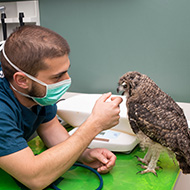
The course provides an overview of legislation and guidance on agencies to contact.
The RSPB has announced a free online CPD course for veterinary professionals to bolster awareness and understanding of bird of prey crime.
Over the course of two hours, participants will receive an introduction to the types of birds of prey, the laws that protect them, and clinical presentations on poisoning, shooting and trapping.
There will also be guidance on the agencies to approach if a bird of prey crime is suspected, and free downloads to use in practice.
The course has been created by wildlife and exotics vet Mark Naguib together with the RSPB Investigations Team. Commenting on why veterinary professionals should participate in the the course, an RSPB spokesperson said:
"Whether you work with exotics and wildlife rarely or every day, at some point in your career you could encounter a wild bird of prey.
"Wild birds are specialist patients and wild birds of prey are targeted by illegal shooting, trapping and poisoning across the UK. Because of how and where these offences happen, they’re notoriously difficult to detect or investigate and the true scale of the problem is believed to be far worse than published figures suggest."
Companion animals and other wildlife are also threatened by these methods, especially poison baits laid out in the countryside on purpose to target wildlife, the RSPB continued.
"These are completely indiscriminate and pose a danger to anything (or anyone) that happens upon them.
"Veterinary professionals are on the front line assessing and treating sick and injured wild birds of prey. They’re in a prime position to make sure valuable evidence is preserved for any investigation initiated by police or other agencies.
"By detecting and reporting these incidents appropriately you’ll also help fill the information gap on just how prevalent bird of prey crime is across the UK."
The course, Birds of prey in veterinary practice: Clinical presentations of poisoning, shooting and trapping, is open to all veterinary professionals and accounts for two hours of CPD. To register, visit the RSPB website.



 The RCVS has announced a new version of its 1CPD mobile app, with enhanced features for veterinary surgeons and veterinary nurses to record their continuing professional development.
The RCVS has announced a new version of its 1CPD mobile app, with enhanced features for veterinary surgeons and veterinary nurses to record their continuing professional development.